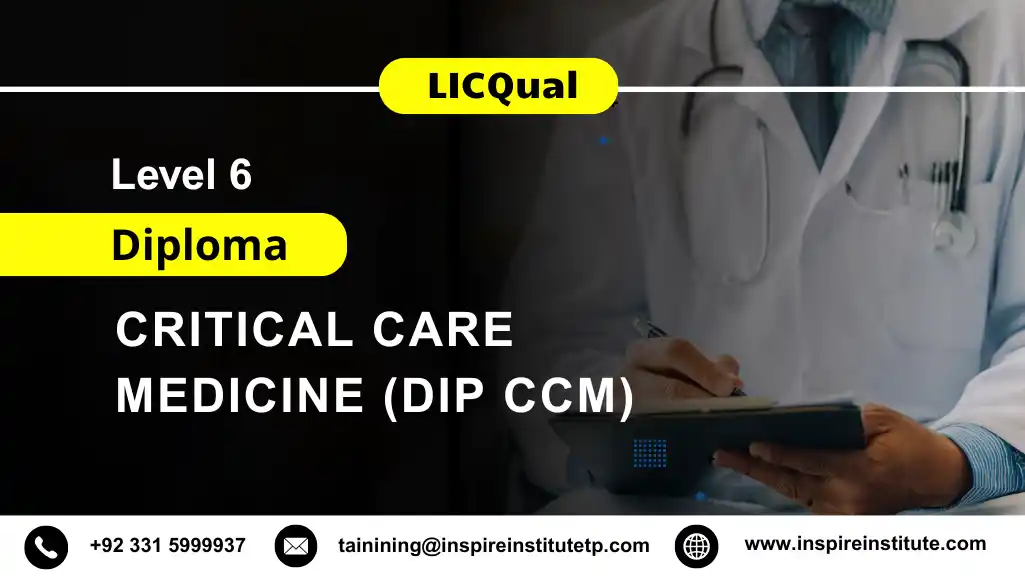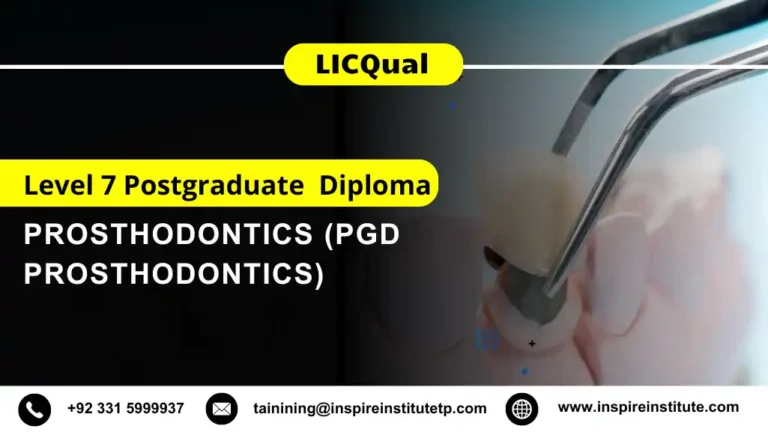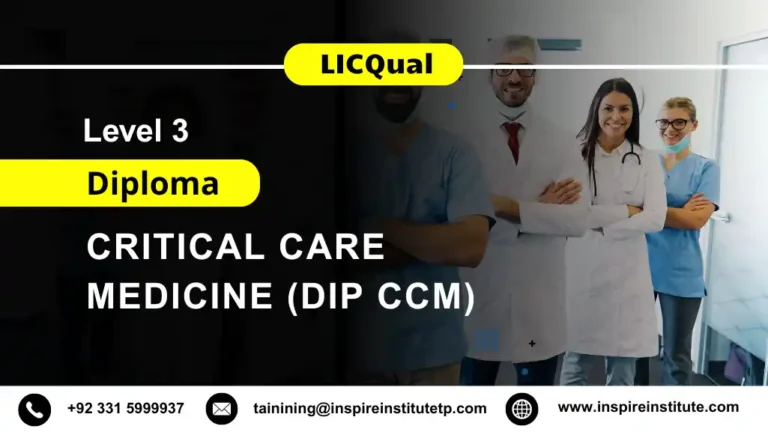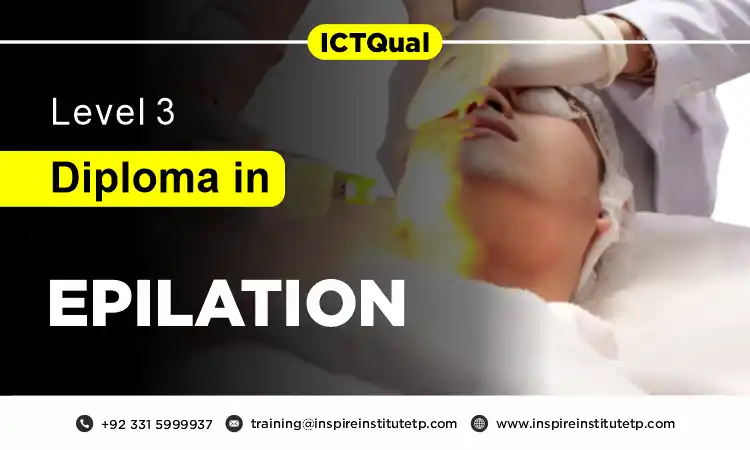LICQual Level 6 Diploma in Critical Care Medicine (Dip CCM)
The LICQual Level 6 Diploma in Critical Care Medicine (Dip CCM) is a UK-accredited qualification designed for healthcare professionals, clinicians, and critical care practitioners seeking advanced expertise in managing critically ill patients. This high-level programme emphasizes the importance of critical care medicine in improving patient outcomes, enhancing clinical decision-making, and ensuring excellence in intensive care delivery. Through this course, learners gain a robust foundation in life-saving interventions, advanced monitoring techniques, and evidence-based critical care practices.
The primary purpose of the LICQual Level 6 Diploma in Critical Care Medicine is to equip healthcare professionals with the knowledge, skills, and practical experience required to manage complex and high-risk clinical scenarios effectively. The course Care Medicine covers critical areas such as hemodynamic monitoring, mechanical ventilation, sepsis management, and multi-organ support, preparing learners to respond confidently to emergencies in intensive care units.
Learners develop specialist knowledge in pathophysiology, critical care pharmacology, and advanced clinical assessment techniques. The curriculum also emphasizes evidence-based approaches to patient management, enabling learners to interpret clinical data accurately and make informed treatment decisions. With a focus on current guidelines and best practices, this diploma ensures healthcare professionals are up-to-date with modern critical care standards.
Practical application is a key component of the LICQual Level 6 Diploma in Critical Care Medicine. Through case studies, simulation exercises, and research-based assignments, learners enhance their ability to perform critical interventions, monitor patient progress, and evaluate treatment effectiveness. The programme also develops teamwork, communication, and leadership skills essential for multidisciplinary critical care environments.
The qualification offers a flexible, assignment-based learning pathway suitable for busy healthcare professionals. Learners can study at their own pace while accessing structured guidance, digital resources, and mentorship from experts in critical care medicine. This approach ensures seamless integration of theoretical knowledge with clinical practice.
Why Choose this Qualification
The LICQual Level 6 Diploma in Critical Care Medicine (Dip CCM) is a premier UK-accredited qualification that equips healthcare professionals with advanced knowledge and practical expertise to excel in intensive care environments. Designed for clinicians, ICU practitioners, and healthcare leaders, this assignment-based diploma integrates evidence-based theory with real-world applications, ensuring learners can manage critically ill patients confidently and efficiently. Choosing this qualification empowers professionals to enhance clinical performance, improve patient outcomes, and advance their careers in critical care medicine globally.
Key Reasons to Choose this Qualification
Specialist Knowledge
- Gain a comprehensive understanding of critical care physiology, pathophysiology, and advanced clinical assessment.
- Explore essential topics including mechanical ventilation, sepsis management, hemodynamic monitoring, and organ support.
- Develop expertise in critical care pharmacology and therapeutic interventions.
- Understand the latest evidence-based guidelines and international ICU protocols.
- Build a solid foundation for complex clinical decision-making in high-risk patient scenarios.
Practical Application
- Apply theoretical knowledge through case studies, simulations, and research-based assignments.
- Enhance skills in diagnosing, monitoring, and managing critically ill patients.
- Develop competence in performing life-saving procedures and interventions.
- Strengthen teamwork and communication skills in multidisciplinary ICU settings.
- Gain hands-on experience in interpreting clinical data and patient monitoring systems.
Recognised Qualification
- Attain a prestigious UK-accredited diploma recognised internationally.
- Validate professional competence in critical care medicine.
- Increase employability in ICU units, emergency departments, and hospital critical care teams.
- Open pathways for advanced studies, fellowships, or leadership roles in critical care.
- Enhance credibility among peers and healthcare institutions globally.
Flexible Learning Pathway
- Study at your own pace through an assignment-based structure.
- Access digital learning materials, mentorship, and interactive resources.
- Integrate studies seamlessly with professional responsibilities.
- Benefit from structured guidance while maintaining career commitments.
- Progress through modules while consolidating practical and theoretical skills.
Evidence-Based Training
- Learn to apply the latest ICU research and clinical guidelines in practice.
- Critically appraise scientific literature for effective patient care.
- Implement validated interventions to improve patient outcomes.
- Gain skills in data interpretation, risk assessment, and outcome evaluation.
- Understand and adopt best practices for quality-critical care delivery.
Career Development
- Unlock diverse opportunities in ICUs, emergency medicine, and critical care departments.
- Prepare for roles such as Critical Care Specialist, ICU Clinician, or Medical Officer.
- Build a foundation for postgraduate training and specialised certifications.
- Enhance your professional portfolio with a globally respected qualification.
- Increase leadership and decision-making potential in high-pressure environments.
Enhanced Patient Care Impact
- Design and implement patient-centred, ethical, and sustainable ICU interventions.
- Improve patient safety, recovery, and overall critical care outcomes.
- Develop strategies for effective risk management and emergency response.
- Advocate for quality-critical care standards across healthcare settings.
- Contribute to the advancement of evidence-based ICU practices.
Professional Growth
- Strengthen leadership, analytical, and clinical decision-making skills.
- Enhance research, problem-solving, and reflective practice abilities.
- Develop confidence in managing complex critical care cases.
- Foster interdisciplinary collaboration and innovation in ICU teams.
- Emerge as a competent, confident, and compassionate critical care professional.
The LICQual Level 6 Diploma in Critical Care Medicine (Dip CCM) is a transformative qualification that advances both clinical expertise and career prospects. By integrating specialised knowledge, practical skills, and evidence-based training, it prepares healthcare professionals to deliver exceptional critical care services and become leaders in ICU and emergency medicine worldwide.way toward achieving professional recognition and advancing psychiatric practice worldwide.
Course Overview
LICQual UK Awarding Body
Average Completion Time:
6-24 Months
Study Units: 6 Units
Evidence & Assignment Based
Mandatory Units
Who Should Take This Course
The LICQual Level 6 Diploma in Critical Care Medicine (Dip CCM) is specifically designed for healthcare professionals seeking to deepen their expertise in managing critically ill patients and enhance their clinical competence in intensive care settings. This qualification is ideal for individuals aiming to advance their careers, develop specialised skills in critical care, and gain internationally recognised credentials. The course Care Medicine ensures learners acquire practical knowledge, evidence-based strategies, and leadership skills essential for high-pressure ICU environments.
This course is suitable for
ICU Nurses and Critical Care Practitioners
- Develop advanced skills in patient monitoring, ventilator management, and emergency interventions.
- Enhance decision-making capabilities in life-threatening situations.
- Gain competence in managing multi-organ dysfunction and critical care pharmacology.
- Apply evidence-based protocols in ICU settings to improve patient outcomes.
- Strengthen collaboration and communication within multidisciplinary ICU teams.
Medical Doctors and Physicians
- Expand knowledge of advanced critical care techniques and ICU procedures.
- Gain expertise in diagnosing and managing complex critical illnesses.
- Implement evidence-based interventions to optimise patient recovery.
- Develop proficiency in clinical decision-making under high-pressure conditions.
- Prepare for leadership roles in ICU units, emergency departments, or specialised critical care centres.
Anaesthetists and Emergency Medicine Specialists
- Enhance understanding of perioperative critical care and post-surgical patient management.
- Apply advanced resuscitation, airway, and hemodynamic management techniques.
- Learn to manage trauma, sepsis, and multi-system failure efficiently.
- Gain practical skills in monitoring, interpreting, and responding to patient data.
- Strengthen competencies for high-stakes clinical scenarios.
Healthcare Managers and ICU Coordinators
- Acquire knowledge in ICU operations, resource allocation, and team management.
- Develop skills for implementing quality-critical care policies and protocols.
- Improve efficiency in patient flow and ICU administration.
- Learn strategies to enhance staff training and multidisciplinary collaboration.
- Apply evidence-based practices to improve ICU performance and patient outcomes.
Paramedics and Critical Care Transport Professionals
- Gain expertise in pre-hospital critical care and patient stabilisation.
- Learn safe transport procedures for critically ill patients.
- Develop skills in emergency interventions and advanced life support.
- Apply knowledge of ICU-level monitoring and decision-making during transport.
- Strengthen preparedness for high-acuity scenarios outside hospital settings.
Postgraduate Medical and Nursing Students
- Build a strong foundation in advanced critical care practice.
- Gain practical insights through case studies and research-based assignments.
- Enhance clinical reasoning, patient assessment, and evidence-based management.
- Prepare for future specialisation in intensive care medicine.
- Improve readiness for professional certifications or ICU rotations.
International Healthcare Professionals
- Acquire globally recognised UK-accredited qualifications.
- Enhance credibility and career opportunities in international critical care settings.
- Learn standardised ICU practices and evidence-based protocols.
- Develop skills to adapt to diverse healthcare systems and patient populations.
- Strengthen professional networks and collaborative opportunities worldwide.
The LICQual Level 6 Diploma in Critical Care Medicine (Dip CCM) is designed for a broad range of healthcare professionals committed to advancing their skills and making a significant impact in critical care environments. By completing this course, learners gain practical expertise, evidence-based knowledge, and the confidence to deliver exceptional patient care in ICU and emergency medicine settings globally.act on population health worldwide.mpassionate, evidence-based care and to contribute meaningfully to the advancement of mental health on both national and global levels.
Course Benefits
The LICQual Level 6 Diploma in Critical Care Medicine (Dip CCM) is a UK-accredited qualification designed for healthcare professionals, critical care practitioners, and aspiring ICU leaders who aim to enhance their expertise in managing critically ill patients and advanced intensive care practices. This comprehensive, assignment-based Diploma in Critical Care Medicine integrates theoretical knowledge with practical applications, enabling learners to develop, implement, and evaluate critical care strategies effectively. Through evidence-based learning and flexible study pathways, this qualification prepares professionals to respond to complex clinical scenarios with confidence and competence.
Key Benefits of the Course
Specialist Knowledge:
- Gain an in-depth understanding of critical care principles, advanced physiology, and pathophysiology.
- Learn about multi-organ support, ventilator management, sepsis care, and hemodynamic monitoring.
- Explore advanced pharmacology, emergency interventions, and ICU procedures.
- Develop insights into evidence-based protocols for managing critically ill patients.
- Build a solid foundation in specialised critical care medicine to support clinical decision-making.
Practical Application:
- Acquire hands-on skills through case studies, simulations, and research-based assignments.
- Strengthen the ability to assess, monitor, and manage complex patient conditions effectively.
- Learn to apply advanced life support and emergency interventions in real-world ICU scenarios.
- Enhance collaboration with multidisciplinary teams for optimal patient outcomes.
- Develop critical problem-solving and clinical decision-making skills in high-pressure environments.
Recognised Qualification:
- Earn a prestigious UK-accredited Diploma in Critical Care Medicine (Dip CCM) validating professional competence.
- Gain an internationally recognised credential that meets global critical care standards.
- Improve employability in hospitals, ICU units, emergency care centres, and academic institutions.
- Open pathways for advanced studies, ICU specialisations, or medical leadership roles.
- Strengthen professional credibility in local and international healthcare sectors.
Flexible Learning Pathway:
- Study at your own pace with an assignment-based structure ideal for working healthcare professionals.
- Access online learning materials, expert mentorship, and interactive resources for continuous support.
- Maintain a balance between career responsibilities and academic advancement.
- Progress through modules without disrupting professional commitments.
- Benefit from a structured, flexible learning environment tailored to individual learner needs.
Evidence-Based Training:
- Engage with the latest clinical research, ICU protocols, and evidence-based practices.
- Critically analyse and apply medical data to improve patient care outcomes.
- Learn to implement validated interventions in high-acuity clinical environments.
- Develop competence in evaluating treatment efficacy and patient response.
- Strengthen research-driven decision-making skills for improved critical care delivery.
Career Development:
- Expand career opportunities in ICU units, critical care hospitals, and emergency departments.
- Prepare for roles such as ICU Specialist, Critical Care Consultant, or Emergency Physician.
- Gain eligibility for postgraduate training, fellowships, or specialised critical care certifications.
- Build a strong professional profile in critical care medicine.
- Enhance prospects in teaching, research, and healthcare policy development.
Enhanced Patient Impact:
- Learn to deliver safe, ethical, and patient-centred critical care interventions.
- Develop strategies for early recognition, rapid response, and preventive ICU care.
- Improve outcomes for critically ill patients through evidence-based practices.
- Implement culturally sensitive and sustainable critical care solutions.
- Contribute meaningfully to hospital and community health improvement.
Professional Growth:
- Strengthen leadership, communication, and analytical skills essential for ICU practice.
- Enhance clinical reasoning, problem-solving, and decision-making capabilities.
- Build confidence to manage complex patient scenarios and high-pressure environments.
- Develop reflective learning and collaborative teamwork competencies.
- Emerge as a skilled, knowledgeable, and confident critical care professional.
The LICQual Level 6 Diploma in Critical Care Medicine (Dip CCM) empowers healthcare professionals to advance their clinical expertise, leadership skills, and evidence-based practice in critical care settings. It equips learners to deliver exceptional patient care, improve ICU outcomes, and achieve global recognition in critical care medicine.
Eligibility Criteria
The LICQual Level 6 Diploma in Critical Care Medicine (Dip CCM) is a UK-accredited qualification designed for healthcare professionals, ICU practitioners, and aspiring critical care leaders who aim to advance their expertise in managing critically ill patients. This assignment-based diploma combines theoretical knowledge with practical applications, enabling learners to develop, implement, and evaluate advanced critical care strategies effectively.
Educational Background:
Applicants should hold a recognised qualification in medicine, nursing, critical care, or a related healthcare field. A Level 5 diploma or equivalent qualification in healthcare, intensive care, or medical sciences may also be accepted. Candidates with international degrees in medicine or allied disciplines will be evaluated individually to determine eligibility and equivalence to UK standards.
Professional Experience:
A minimum of one year of experience in healthcare, ICU practice, emergency care, or a related field is recommended. Previous exposure to patient monitoring, ventilator management, or intensive care procedures provides an advantage. Motivated applicants with a strong interest in critical care, patient safety, or medical leadership, even without direct ICU experience, are encouraged to apply.
Age Requirement:
Applicants must be at least 18 years old at the time of enrolment. This ensures learners possess the maturity, ethical understanding, and professional responsibility required for advanced study and practical application in critical care medicine.
Language Proficiency:
As the programme is delivered entirely in English, learners must demonstrate proficiency in reading, writing, and communication. A minimum IELTS score of 6.0 or an equivalent qualification is recommended for non-native English speakers to ensure effective participation in assignments, discussions, and assessments.
Technical Requirements:
Learners should have access to a computer or laptop with a reliable internet connection to participate in online learning, access study materials, and submit assignments. Basic computer literacy, including proficiency in research, data analysis, document preparation, and communication tools, is essential for academic success.
Required Documents:
Applicants are required to submit the following documents during registration:
A valid ID card or passport for identity verification.
Academic transcripts or certificates of previous qualifications.
Proof of professional experience in healthcare, ICU, or related settings (if applicable).
The Qualification Process
LICQual Level 6 Diploma in Critical Care Medicine (Dip CCM) follows a structured pathway to ensure learners gain comprehensive knowledge, practical skills, and professional competence in community oral healthcare.
Step 1: Self-Assessment
Learners review the entry requirements to confirm eligibility. Candidates with a background in dentistry, oral health, or public health are encouraged to apply.
Step 2: Registration
Complete the registration process by submitting required documents such as proof of qualifications, a valid ID, and payment of enrollment fees.
Step 3: Induction
An induction session is conducted to:
- Verify learner eligibility and documentation.
- Introduce study materials, learning outcomes, and assessment procedures.
Step 4: Learning and Evidence Submission
Learners complete assignments, case studies, and practical exercises demonstrating competence in public health dentistry, community oral health assessment, preventive strategies, and program planning.
Step 5: Feedback and Revision
Assessors review submitted evidence and provide constructive feedback. Learners can revise and resubmit work to meet all required standards.
Step 6: Competence Validation
Final submissions are evaluated to confirm that learners have met all theoretical and practical learning outcomes.
Step 7: Internal Quality Assurance (IQA)
The IQA team reviews the assessment process to ensure accuracy, fairness, and compliance with international standards.
Step 8: External Verification (EQA)
External verifiers validate the authenticity and quality of learner achievements.
Step 9: Certification
Upon successful verification, learners are awarded LICQual Level 6 Diploma in Critical Care Medicine (Dip CCM), demonstrating advanced proficiency in community oral healthcare and preparing them for professional growth in dental public health, preventive dentistry, and healthcare policy.







